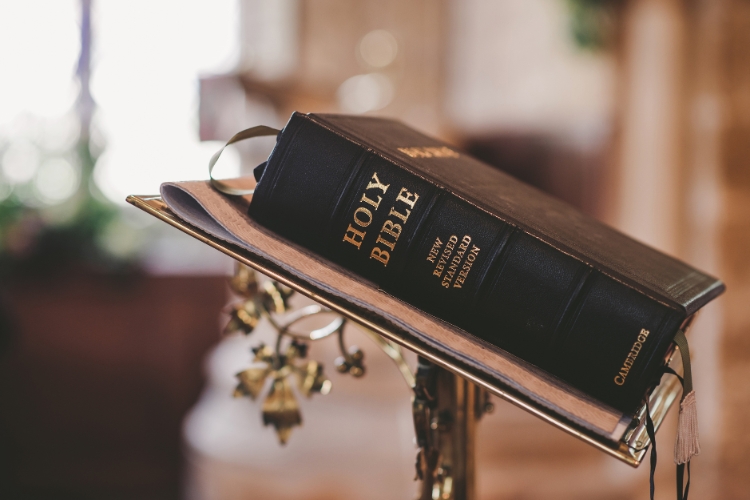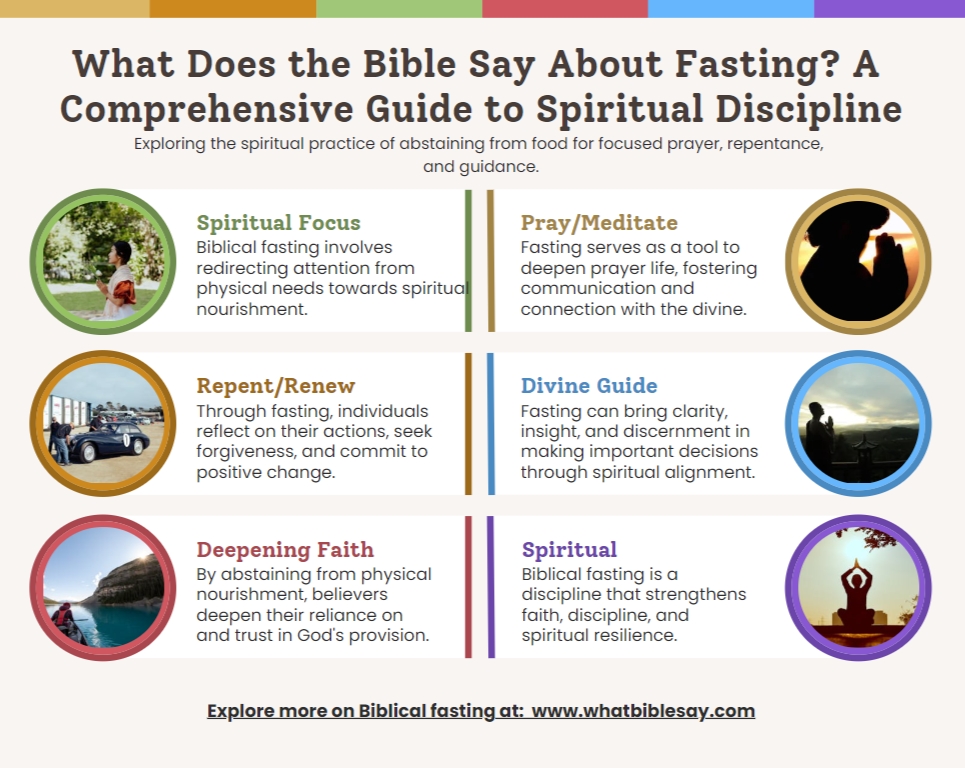Fasting is a powerful spiritual practice that believers have observed for thousands of years. In this comprehensive guide, we’ll explore what the Bible says about fasting, its purposes, benefits, and how to incorporate this meaningful discipline into your spiritual life. Whether you’re new to fasting or looking to deepen your understanding, this article will provide valuable insights into this ancient practice.
1. Understanding Fasting in Biblical Context
Fasting, in its simplest form, is the act of abstaining from food or drink for a set period. However, in the Bible, fasting is much more than just skipping meals. It’s a spiritual discipline that involves denying oneself to focus more intently on God.
Key Aspects of Biblical Fasting:
- Abstinence from food and/or drink
- Increased focus on prayer and spiritual matters
- Often accompanied by repentance and seeking God’s guidance
- Can be individual or communal
- Varies in duration (from part of a day to extended periods)
2. The Origins of Fasting in the Old Testament
Fasting has deep roots in the Old Testament, where it was practiced for various reasons.
Notable Old Testament Fasts:
- Moses fasted for 40 days and nights on Mount Sinai (Exodus 34:28)
- King David fasted when his child was ill (2 Samuel 12:16-23)
- Elijah fasted for 40 days in the wilderness (1 Kings 19:8)
- The people of Nineveh fasted in response to Jonah’s prophecy (Jonah 3:5-10)
Purposes of Fasting in the Old Testament:
- Repentance: Fasting was often associated with turning away from sin and seeking God’s forgiveness.
- Mourning: People fasted as an expression of grief or sorrow.
- Seeking God’s Intervention: Fasting was practiced when facing significant challenges or decisions.
- Preparation for Divine Encounters: Many biblical figures fasted before receiving revelations from God.
3. Jesus and Fasting in the New Testament
Jesus brought new perspectives on fasting, emphasizing its spiritual nature over mere ritual observance.
Key Teachings of Jesus on Fasting:
- Matthew 6:16-18: Jesus taught that fasting should be done in secret, without drawing attention to oneself.
- Matthew 9:14-15: Jesus indicated that his followers would fast after his departure.
- Matthew 4:1-11: Jesus fasted for 40 days in the wilderness before beginning his ministry.
The Early Church and Fasting
The early Christian church continued the practice of fasting, as seen in the book of Acts and the Epistles.
- Acts 13:2-3: The church fasted before sending out missionaries.
- Acts 14:23: Fasting accompanied the appointment of elders in the church.
- 1 Corinthians 7:5: Paul mentions fasting in the context of married life.
4. Types of Fasts Mentioned in the Bible
The Bible describes various types of fasts, each with its own purpose and duration.
Common Types of Biblical Fasts:
- Normal Fast: Abstaining from food but not water (Matthew 4:2)
- Partial Fast: Limiting certain foods or drinks (Daniel 10:3)
- Absolute Fast: Abstaining from both food and water (Esther 4:16)
- Corporate Fast: Fasting as a community (Joel 2:15-16)
- Regular Fast: Fasting as a routine spiritual practice (Luke 2:37)
5. The Purposes of Fasting According to Scripture
The Bible outlines several reasons why believers might engage in fasting.
Biblical Reasons for Fasting:
- Spiritual Renewal: Fasting can help reset one’s focus on God (Joel 2:12)
- Repentance: Fasting often accompanies turning away from sin (Jonah 3:5-9)
- Guidance: Seeking God’s direction through fasting (Acts 13:2)
- Deliverance: Fasting when facing significant challenges (Esther 4:16)
- Healing: Seeking God’s healing through prayer and fasting (Isaiah 58:6-8)
- Worship: Fasting as an act of devotion and worship (Luke 2:37)
6. The Relationship Between Fasting and Prayer
In the Bible, fasting is often closely linked with prayer, creating a powerful spiritual combination.
How Fasting Enhances Prayer:
- Increases focus and intensity in prayer
- Demonstrates sincerity and urgency in seeking God
- Helps overcome spiritual obstacles (Mark 9:29)
- Creates space for extended periods of prayer and meditation
7. Warnings and Cautions About Fasting in the Bible
While the Bible encourages fasting, it also provides warnings about misusing or misunderstanding this practice.
Biblical Cautions on Fasting:
- Avoid Hypocrisy: Don’t fast to impress others (Matthew 6:16-18)
- Don’t Neglect Mercy: Fasting should lead to compassionate actions (Isaiah 58:3-7)
- Not a Means of Manipulation: Fasting doesn’t force God’s hand (Jeremiah 14:12)
- Physical Health: Consider your health when fasting (1 Corinthians 6:19-20)
8. The Benefits of Fasting According to Scripture
The Bible outlines several spiritual benefits that can result from sincere fasting.
Spiritual Benefits of Fasting:
- Increased Spiritual Sensitivity: Fasting can heighten awareness of God’s presence and voice.
- Overcoming Temptation: Jesus fasted before facing temptation (Matthew 4:1-11).
- Spiritual Breakthrough: Fasting can lead to breakthroughs in prayer and spiritual warfare (Mark 9:29).
- Clarity and Direction: Fasting can help in discerning God’s will (Acts 13:2-3).
- Deepened Humility: Fasting reminds us of our dependence on God (Psalm 35:13).
9. How to Fast According to Biblical Principles
While the Bible doesn’t prescribe a single method of fasting, it does provide principles to guide the practice.
Guidelines for Biblical Fasting:
- Set a Clear Purpose: Determine why you are fasting (Ezra 8:21).
- Prepare Spiritually: Confess your sins and seek God’s guidance before fasting.
- Choose an Appropriate Fast: Consider your health and circumstances when deciding on the type and duration of your fast.
- Plan Your Time: Set aside extra time for prayer and Bible study during your fast.
- Break the Fast Gradually: Especially for longer fasts, ease back into normal eating.
10. Fasting in Different Christian Traditions
Different Christian denominations and traditions have varied approaches to fasting.
Fasting Practices Across Christianity:
| Tradition | Typical Fasting Practices |
|---|---|
| Eastern Orthodox | Regular fasting days and seasons, often abstaining from animal products |
| Roman Catholic | Fasting on Ash Wednesday and Good Friday, abstinence from meat on Fridays during Lent |
| Protestant | Varies widely, often emphasizing individual-led fasting |
| Coptic | Strict fasting practices, including vegan diets for extended periods |
11. Common Questions About Biblical Fasting
1. Is fasting mandatory for Christians?
While the Bible speaks positively about fasting, it’s not explicitly commanded for all believers. Jesus assumed his followers would fast (Matthew 6:16-18), but it’s generally seen as a voluntary spiritual discipline.
2. How long should a fast last?
The Bible describes fasts of various lengths, from part of a day to 40 days. The duration should be based on your purpose, physical health, and spiritual guidance.
3. Can fasting include abstaining from things other than food?
Yes, some choose to fast from activities like social media, television, or other habits to focus more on their relationship with God.
4. Should fasting be a regular practice?
Some believers incorporate regular fasting into their spiritual lives, while others fast occasionally or for specific purposes. There’s no one-size-fits-all approach in Scripture.
Conclusion, Embracing Fasting as a Spiritual Discipline
Fasting, as described in the Bible, is a powerful spiritual discipline that can deepen one’s relationship with God, provide clarity in decision-making, and strengthen one’s faith. By understanding what the Bible says about fasting, believers can approach this practice with wisdom, sincerity, and purpose.
Remember, the heart behind the fast is more important than the act itself. As you consider incorporating fasting into your spiritual life, focus on drawing closer to God and aligning your will with His. Whether you’re fasting for a meal, a day, or an extended period, let it be a time of increased prayer, reflection, and spiritual growth.
As with any spiritual practice, it’s wise to consult with spiritual leaders and healthcare professionals, especially if you have health concerns or are new to fasting. May your fasting journey be a blessed time of spiritual renewal and deepened faith.






